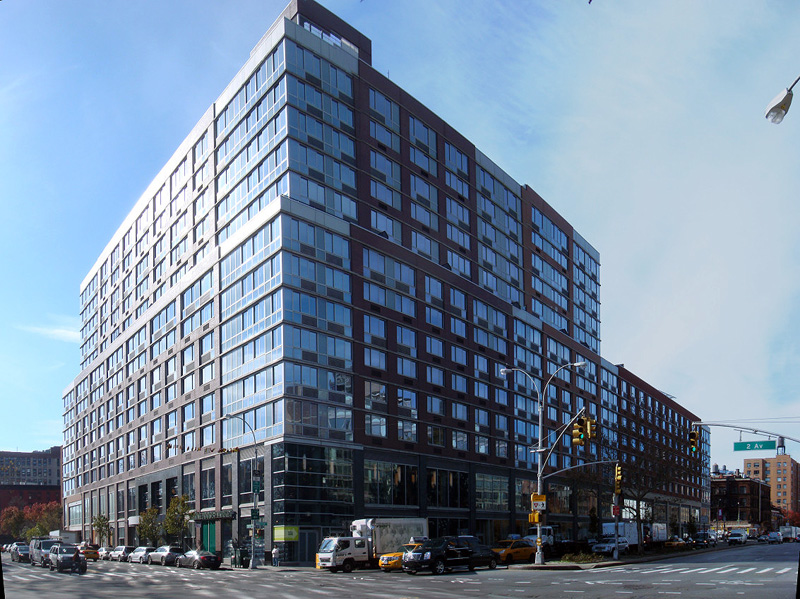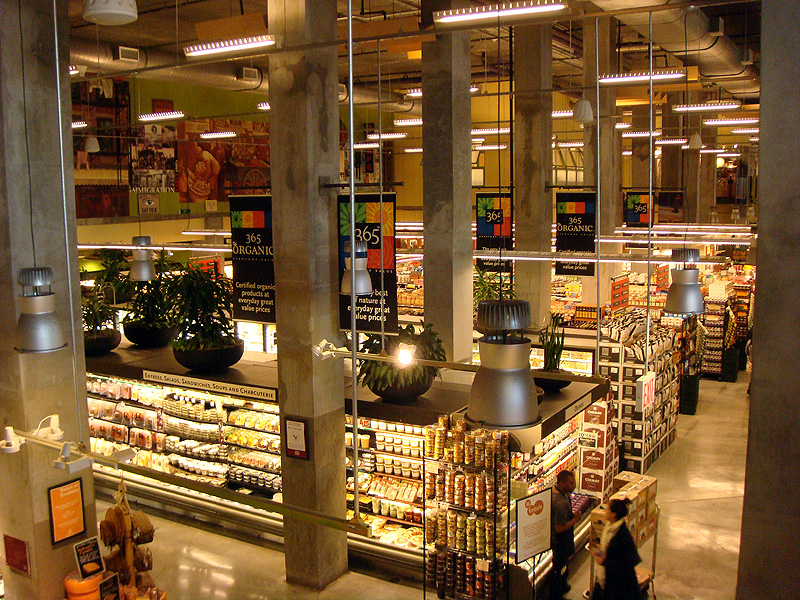
Big Box Stores are usually associated more with suburban strip malls and auto-dominated sprawl than dense city living. That doesn’t have to be the case, however, as design considerations can bring large retailers into the city core without expanses of parking lots and with a mix of uses on top.
The photos above and below are of a Whole Foods Market in New York City only a few blocks from my apartment. Big Box retail is all over New York, mostly in large older buildings, but new structures are being built to house large retailers as well. There’s even a so-called “Big Box District” where you can find any of the large-scale stores common in the suburbs right in the middle of Manhattan.
Recently, CoolTown Studios featured a similar project in Vancouver with a supermarket and a Home Depot at the sidewalk level, parking underground, and 90 condos and townhouses above. It features a total of 212,000 square feet of retail and a large green roof serving as a community garden over part of the retail space.

Both buildings discussed here aren’t exactly architectural masterpieces, but they bring in an otherwise impossible retail use into the city. While it may not be popular among the diehard shop local fans, sometimes even a city resident needs something a big box retailer sells nowadays such as a large plastic storage tub or an alarm clock radio. We’re going to eventually need larger grocery stores in urban areas as well. I believe an appropriate mix of national and local retailers creates the most functional city for all residents.
Large retail hasn’t really happened in the core of Louisville, yet. There was talk in Business First earlier this year that T.J. Maxx wanted to open a store in Downtown Louisville, but finding the right size space was a problem. Should we be encouraging developers to include large spaces in new projects? Should we try to bring big box retail Downtown at all?
I have seen other examples of an urban big box stores in Chicago where the retail space occupies the ground floor of a parking garage. If you shop at the store, you get a waiver or discount on parking in the garage. Most new garages built in Louisville have some sort of retail component, but usually just a token amount of a couple thousand square feet. Should new garages be built with larger spaces? How is urban shopping going to change in the average American city as density and population rises?



I’ve seen Whole Foods stores like this incorporated into downtowns in Toronto and Seattle as well. I’ve always thought that the Louisville location should’ve set up shop closer to downtown.
Wow. Can of worms. I’ll only pull out two.
1) No, we shouldn’t build parking garages so that people can shop at a Whole Foods or Target. If you have a car and actually want to shop at these establishments, there are plenty of places to park in St. Matthews. We need retail for people who LIVE downtown, people who want to be able to walk down the street for groceries.
2) No, we shouldn’t sell out to the big chains. I’m not saying that it wouldn’t be nice to have a few big retail options downtown (even something completely boring like a Dillards would be nice), but let’s not make a policy of it. I would rather see dozens of smaller shops with reasonably priced goods catering to residents. In Old Louisville, restaurants come and go all the time. I think the problem is that they are a little too high-end. They’re not looking around and seeing what their neighbors want.
That’s just my off-the-cuff thoughts on the issue, but I could be persuaded otherwise.
Wholeheartedly agree with Eric B’s #1. As probably mentioned here already, parking requirements are completely excessive and, should a major retailer locate in downtown Louisville, the decision should not be required in conjunction with (outrageous) auto parking concessions.
Somewhat differ on Eric’s #2. While the city should not “give away the farm” to entice big-box retailers downtown, “dozens of smaller shops with reasonably priced goods” just won’t happen overnight (or probably within a decade even with economic incentives/forgivable loans). Though, that would be my eventual ideal, it would be easier (and more effective) for the city to target (no pun intended!) a big-box or two at first to create the beginnings of a retail movement downtown. Additionally, as Branden brought up, I question the ability of smaller, local shops to provide commonsense essentials like “plastic storage tubs” and clock radios.
I live in Upper Manhattan and I think that there are probably a dozen stores within a five-block radius that sell clock radios and plastic storage tubs.
It's better for cities to support local small businesses that are invested in the community (they have nowhere else to go) than big-box stores that can close if unsuccessful.
Point taken, but I live in (very-near) downtown Louisville and there is nowhere near me (allowing even a much >5 block radius) that sells essentials, be it a chain, big-box, or independent. At least that I know of.
And really, perception is reality in this case…if I don't know a store exists, it's simple not there for me. I'd like to think I have my ear pretty close to the ground.
And even if someone could cite a place where I could buy "essentials" at a walking distance, I am not such a dogmatic urbanite as to pay double-cost or suffer extreme lack of selection to say that I've done so (but I certainly give new businesses a fair shake). Some convenience items are certainly worth the added cost imposed by nearby, small, local stores. But, unfortunately, a cold, rational cost-benefit analysis reveals that many times a car-ride to an inner-ring, suburban big-box store is in order. Again, I think that's unfortunate, but I'm not going to fudge my own numbers (in this economy!) to rationalize anything less than financial prudence.
I do agree that local businesses are far more invested in the community. They deserve support–both with shoppers' dollars and city incentives. However, I don't share the nearly reflexive belief of many urban-minded city dwellers (and I'm not necessarily referring to anyone on this blog) that big-box retailers and chain stores are parasitic to city life or local economies. I think they can actually help spur some local business growth and certainly serve some purpose. Now, I'm off to procure some clock radios and plastic tubs.
I agree and somewhat disagree. You will need parking even for something like this. There just isn't enough people living in walking distance of downtown who would benefit from it. You need parking and if your going to have it better to hide it or make it look highly attractive and on a human scale.
Bedsies, there are a lot of residents in Western Louisville (myself included) who would love to have this type of retail so close to me. I get tired of going to southern Indiana for everything.
The second point. In an urban setting such as downtown Louisville you would need this type of "big box" retail to help smaller local shops survive. If you had say an urban Target and whole foods they would draw people from all of the neighborhoods that immediately surround downtown. They would draw enough people that local business could set up either down the street or on the same block and benefit greatly. The "big box" stores would become anchor tenets for our local businesses.